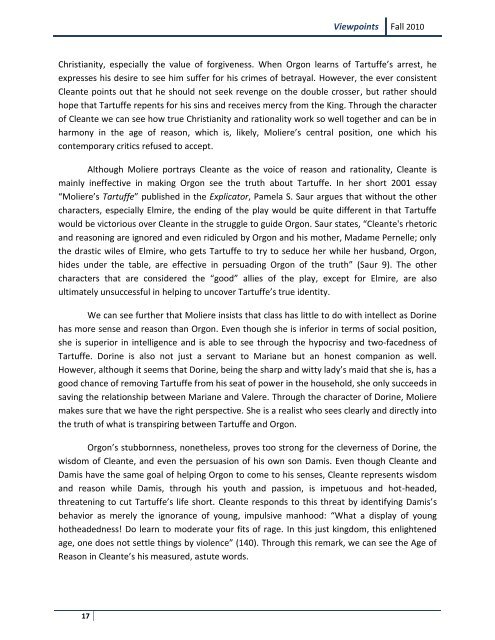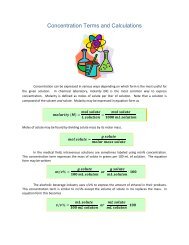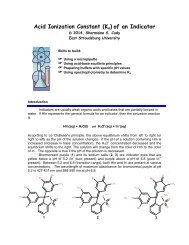Orgon's Obsession in Moliere's Tartuffe
Orgon's Obsession in Moliere's Tartuffe
Orgon's Obsession in Moliere's Tartuffe
Create successful ePaper yourself
Turn your PDF publications into a flip-book with our unique Google optimized e-Paper software.
17<br />
Viewpo<strong>in</strong>ts Fall 2010<br />
Christianity, especially the value of forgiveness. When Orgon learns of <strong>Tartuffe</strong>’s arrest, he<br />
expresses his desire to see him suffer for his crimes of betrayal. However, the ever consistent<br />
Cleante po<strong>in</strong>ts out that he should not seek revenge on the double crosser, but rather should<br />
hope that <strong>Tartuffe</strong> repents for his s<strong>in</strong>s and receives mercy from the K<strong>in</strong>g. Through the character<br />
of Cleante we can see how true Christianity and rationality work so well together and can be <strong>in</strong><br />
harmony <strong>in</strong> the age of reason, which is, likely, Moliere’s central position, one which his<br />
contemporary critics refused to accept.<br />
Although Moliere portrays Cleante as the voice of reason and rationality, Cleante is<br />
ma<strong>in</strong>ly <strong>in</strong>effective <strong>in</strong> mak<strong>in</strong>g Orgon see the truth about <strong>Tartuffe</strong>. In her short 2001 essay<br />
“Moliere’s <strong>Tartuffe</strong>” published <strong>in</strong> the Explicator, Pamela S. Saur argues that without the other<br />
characters, especially Elmire, the end<strong>in</strong>g of the play would be quite different <strong>in</strong> that <strong>Tartuffe</strong><br />
would be victorious over Cleante <strong>in</strong> the struggle to guide Orgon. Saur states, “Cleante's rhetoric<br />
and reason<strong>in</strong>g are ignored and even ridiculed by Orgon and his mother, Madame Pernelle; only<br />
the drastic wiles of Elmire, who gets <strong>Tartuffe</strong> to try to seduce her while her husband, Orgon,<br />
hides under the table, are effective <strong>in</strong> persuad<strong>in</strong>g Orgon of the truth” (Saur 9). The other<br />
characters that are considered the “good” allies of the play, except for Elmire, are also<br />
ultimately unsuccessful <strong>in</strong> help<strong>in</strong>g to uncover <strong>Tartuffe</strong>’s true identity.<br />
We can see further that Moliere <strong>in</strong>sists that class has little to do with <strong>in</strong>tellect as Dor<strong>in</strong>e<br />
has more sense and reason than Orgon. Even though she is <strong>in</strong>ferior <strong>in</strong> terms of social position,<br />
she is superior <strong>in</strong> <strong>in</strong>telligence and is able to see through the hypocrisy and two-facedness of<br />
<strong>Tartuffe</strong>. Dor<strong>in</strong>e is also not just a servant to Mariane but an honest companion as well.<br />
However, although it seems that Dor<strong>in</strong>e, be<strong>in</strong>g the sharp and witty lady’s maid that she is, has a<br />
good chance of remov<strong>in</strong>g <strong>Tartuffe</strong> from his seat of power <strong>in</strong> the household, she only succeeds <strong>in</strong><br />
sav<strong>in</strong>g the relationship between Mariane and Valere. Through the character of Dor<strong>in</strong>e, Moliere<br />
makes sure that we have the right perspective. She is a realist who sees clearly and directly <strong>in</strong>to<br />
the truth of what is transpir<strong>in</strong>g between <strong>Tartuffe</strong> and Orgon.<br />
Orgon’s stubbornness, nonetheless, proves too strong for the cleverness of Dor<strong>in</strong>e, the<br />
wisdom of Cleante, and even the persuasion of his own son Damis. Even though Cleante and<br />
Damis have the same goal of help<strong>in</strong>g Orgon to come to his senses, Cleante represents wisdom<br />
and reason while Damis, through his youth and passion, is impetuous and hot-headed,<br />
threaten<strong>in</strong>g to cut <strong>Tartuffe</strong>’s life short. Cleante responds to this threat by identify<strong>in</strong>g Damis’s<br />
behavior as merely the ignorance of young, impulsive manhood: “What a display of young<br />
hotheadedness! Do learn to moderate your fits of rage. In this just k<strong>in</strong>gdom, this enlightened<br />
age, one does not settle th<strong>in</strong>gs by violence” (140). Through this remark, we can see the Age of<br />
Reason <strong>in</strong> Cleante’s his measured, astute words.








